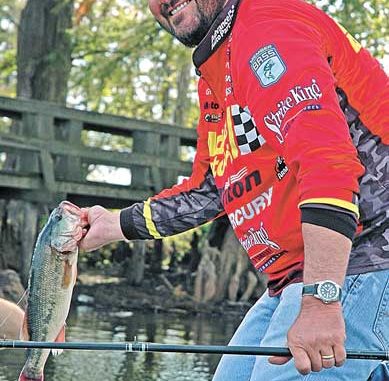
For wintertime crappie, try these deadly trolling techniques on any of several Louisiana lakes.
This month, I’ll be fishing Cross Lake near Shreveport for two very good reasons. Cross Lake has most of the same type of structure and water as the Red River, and since the Red River is off-limits until the Bassmasters Classic, this place is really good for practicing and trying to determine what lures and techniques I’ll need to fish during the Classic to win.
So even though I can’t fish the Red River until the Classic, I can fish Cross Lake, a mini Red River located in the same part of the state.
Also, I like Cross because it holds really big bass. The two dominant types of cover are cypress trees and boat docks. In the northwest end of the lake is a big cypress flat, and the middle and lower parts of the lake are dominated by boat docks with isolated cypress trees between them.
Cross is a really shallow lake with the deepest part only about 25 feet deep and the average depth about 4 feet. So this lake will warm up really fast, causing the fish to move shallow in preparation for the spawn. The lake also is extremely fertile with a good forage base.
In the past, Cross Lake has enforced slot limits to protect the bigger bass, and today it has a really good population of bass that weigh 5 pounds or more. Although you won’t get 50 bites in one day, you may catch five bass that weigh 5 pounds or more per day and have a legitimate chance of catching a 10-pound-plus bass.
What to fish and how
My main lures on this lake are a jig, because the lake is set up perfectly for jig fishing, and a spinnerbait — two lures I also expect to fish the most in the Classic. Both lures catch big bass.
The most-productive spinnerbait colors on Cross will be white/chartreuse, chartreuse, orange/chartreuse and solid red. If the water’s really clear, I’ll fish the red spinnerbait, and if the water’s stained, I’ll fish the white/chartreuse or the solid-chartreuse spinnerbait.
My spinnerbait either will have Colorado or Indiana blades because during February, I want to fish a spinnerbait with a lot of thump to it to help the bass feel the bait and find it. The bass will bite more actively if they can feel the bait coming toward them.
I’ll be fishing a black/blue jig in February around cypress trees. Most of this lake’s cypresses don’t have knees, but instead have root systems that create rings around the trees out about 10 feet. The bass either will be right up against the trunk of the tree or farther away from the tree holding in that root system.
A warm, sunny day during February usually means the bass will be holding tight up against the trunks of the trees, and they’ll be easy to catch, if you’ll hit the trunk of the tree with your jig or spinnerbait and then start working the lure away from the trunk. The bass generally will be within the first foot of water away from the trunk.
If the weather’s cloudy with low-light conditions, the bass will move away from the trunks of the trees and hold out in the root systems. If the bass are out on the roots, the spinnerbait will be a better choice, because I’ll have to fish larger areas and cover more water to get a bite than if I’m fishing a jig right up against the tree trunk. I’ll really saturate the section around the tree with my spinnerbait until I determine whether the bass are holding against the trunk of the tree or out on the root system.
I also may fish the Strike King Red Eye Shad to cover more water quicker and find the fish faster than I can with the jig or the spinnerbait. Once I learn where the bass are holding in the trees, I’ll make 10 to 12 casts on the front side of the tree to entice a bass to bite.
The bass in this lake probably will be more shallow than the Red River bass. But the water temperature on Cross Lake will be about the same as the water temperature on the Red River. Also, the bass in Cross Lake will take the same baits in February as the bass on the Red River. Of course, this area receives a lot of rain, and the Red River will muddy up quicker and stay muddy longer than Cross Lake.
If the weather’s stable, the bass in Cross will act pretty much like the bass in the Red River. Therefore, the information I learn about the bass from fishing Cross Lake will give me a pretty good idea of how I need to fish the Bassmaster Classic on the Red River. A number of tournament fishermen will plan to fish Cross Lake this month because it’s very close to Shreveport. Also, this is a great month to catch a big bass out of Cross Lake.
I love to fish in Louisiana because if you fish from North Louisiana to South Louisiana, you’ll find just about every type of water you can you expect to fish anywhere in the nation. If I weren’t a tournament fisherman, I’d probably never leave the state to bass fish, except maybe to fish those big-bass lakes in Texas.


